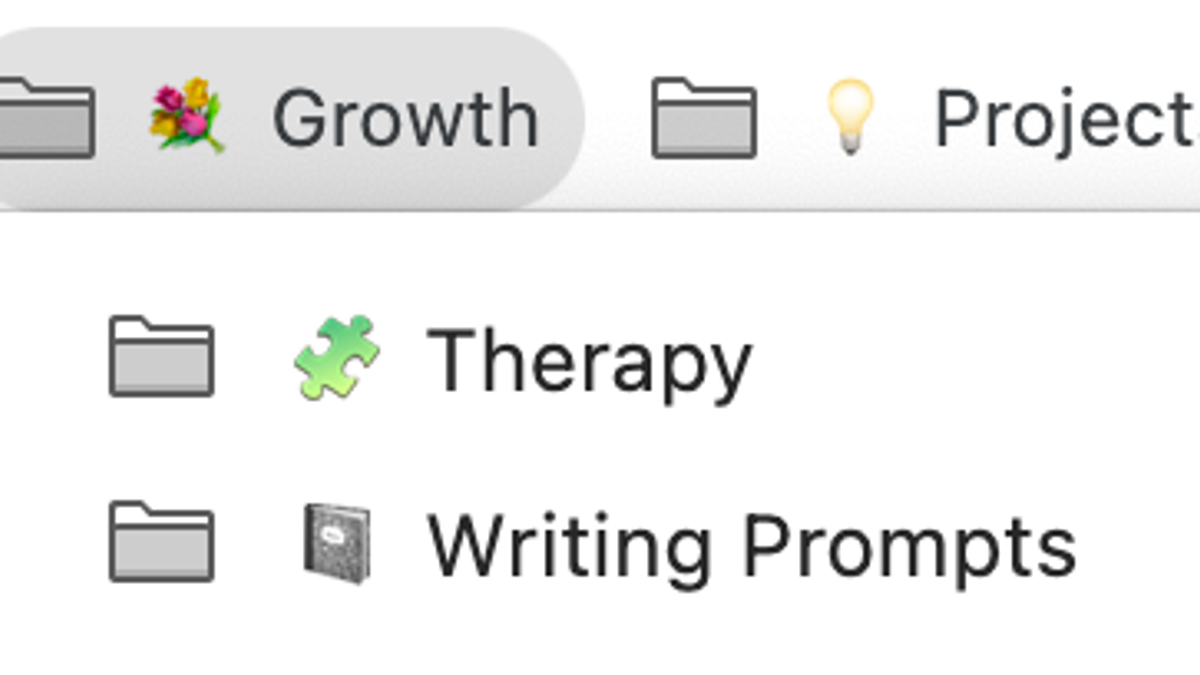
7 Tips For Preparing For Your First Therapy Session
Whether you’re new to therapy or starting over, here’s how to prepare for a first session with a new therapist.
A first session with a new therapist can be a lot of things: nerve-racking, overwhelming, intimidating, or even exciting.
However you’re feeling is completely valid — opening up to a stranger and asking for support, even if the person we’re speaking with is technically a trained professional, can bring up a lot for us, even if it’s not our first therapy rodeo.
That said, with the right fit, therapy can be a big step toward a more empowered and authentic version of ourselves.
Therapy can support us in building confidence, unlearning harmful narratives we hold about ourselves, navigating difficult seasons of life, and allows us to be truly seen by someone, however messy that process may be.
(And yes, these benefits can be a part of therapy even if we aren't in crisis or otherwise feel "fine"!)
I’m so glad that you’re open to giving yourself this gift.
Whether it’s a journey you’ve attempted before, or the very first time, I hope you’ll be gentle with yourself as you prepare!
Some of these tips may feel basic, but I wanted to make sure we covered all the bases. I’ll be sure to offer some unique tips for the therapy veterans among us, though, to keep things interesting.
Here are my best tips for preparing for a first therapy session.
1. Familiarize yourself with the intake process.
Every therapist has their own intake process, but most intake processes have a few things in common! Namely, they typically involve paperwork, an “interview,” and an opportunity to ask your therapist questions.
Yes, there’s paperwork — and it might be tedious.
Before beginning your work together, your therapist will have you read and sign some documents. This usually includes consent to treatment, some privacy agreements, and more information about your therapist’s practice and policies, including their no-show policy and communication boundaries.
There may also be questionnaires to better understand what you’re struggling with, and your therapist may also use clinical assessments, like the PHQ-9 and GAD-7, which track symptoms associated with depression and anxiety, respectively.
If you’re the kind of person that prefers to take your time reading and responding, please feel empowered to ask for this paperwork ahead of your appointment, or arrive extra early if doing so in-person!
There are a few things you’ll want to bring with you...
- An open mind and heart: Yes, we move at the speed of trust — and there’s no shame in taking time to unfurl. And, therapy is so much more impactful when we commit to being honest, vulnerable, and open whenever possible. Remember, a therapist’s role is not to judge or shame you, but instead, to meet you with compassion.
- Soothing tools: Because the paperwork and initial intake can touch on a wide array of sensitive topics, you might have a “cope ahead” plan, where you bring a fidget toy or a grounding tool if these kinds of questions tend to overwhelm or agitate you.
- Insurance card, photo ID, and payment info: If you plan to use insurance to cover therapy, your therapist will also ask for that information, likely before the session. If your appointment is in-person, be sure to bring your insurance card and a valid photo ID with you regardless. Your therapist will also want your payment information on file, even if you’re using insurance, in case of a co-pay or lapse of coverage.
- Talking points or notes: We’ll get into more of the specifics in later sections, but if you have any notes on issues you want to discuss or questions you might want to ask, feel free to bring those with you!
- A journal: Some folks like to journal before, during, or after their therapy session. This could be a plain ol’ lined notebook, or something a little more creative (my personal favorite is the Reclaim Journal, where I choose the feeling that came up most prominently during the session and follow the prompts!).
- A care plan: Therapy, even the very first intake, can be emotionally overwhelming and taxing! You might consider what self-care practices you’d like to partake in after your therapy session. Some people may take a walk, get an iced coffee, cocoon under a weighted blanket, or text a friend. Whatever you decide to do, make sure you’ve blocked off time in your calendar after the appointment to make room for it!
Ask for what you need — even if it’s not “typical”!
You might call or email ahead of time and ask for specific accommodations, like if you prefer to do the paperwork ahead of time, if you need a language interpreter, or if you’d like to avoid certain topics in your initial conversation.
If you’re doing virtual therapy, you might also let your therapist know if you rely on a chat feature in your session (for folks who experience situations where they can’t or strongly prefer not to speak aloud) or closed captions to ensure they can accommodate you.
Whatever you need to feel comfortable, don’t hesitate to ask and see if your therapist can support you.
Know what to expect in your first conversation.
The first therapy session typically involves what’s known as a “biopsychosocial intake,” which is just a fancy way of saying “an interview that looks at your past and present circumstances that may be influencing your mental health.”
You’ll likely be asked questions about:
- Your therapy “why”: What’s bringing you to therapy, which can include anywhere you might be struggling and how that’s impacting you, as well as what you hope therapy can offer you.
- Your substance use: Disclosing your substance use doesn’t mean you’ll be diagnosed with a substance use disorder! Not all substance use needs to be addressed in therapy, but it’s helpful context for your therapist, as some substances may be masking other struggles (like ADHD or social anxiety).
- Your relationships: This will include who you currently live with, your relationship status, your family history, and any struggles you’ve had with relationships, including abuse history or relationship difficulties.
- Your education, work, and hobbies: Your therapist will likely ask you what levels of education you’ve completed, if you work and what you do for work, and what you do for fun.
- Your medical and legal history: Your therapist may also ask if you have any chronic conditions, if you’ve been arrested or incarcerated, and anything related that might impact your work together.
- Your mental health history: Lastly, your therapist will ask you about your mental health history, including if you’ve been to therapy before, if you’ve received any mental health diagnoses in the past, if you’ve completed any kind of intensive treatment (like an outpatient program or if you’ve been hospitalized), and if you have a history of self-harm.
“We're moving kind of fast...”
Since your therapist is trying to cover a lot of ground in these first few conversations, you may notice that they might not respond in-depth to what you’ve shared. This is totally normal, and doesn’t mean that they don’t take what you’re disclosing seriously or that you won’t have a chance to unpack it more later!
If you do feel overwhelmed or rushed at any point, don’t hesitate to ask your therapist if you can pause, regroup, and check in.
A good therapist will honor your capacity and ensure that you aren’t trying to do too much, too fast.
Remember, you don’t need to get to everything!
If you aren’t able to get out everything you wanted to say in that first session, that’s fine! You can always pick things back up in the next session.
Your first session will rarely cover everything, but it doesn’t have to — you’ll have plenty of time to unpack things as you continue working together.
2. Think or journal about your “why” for therapy.
More than likely, this will be the natural starting point for your work together, so it can be worthwhile to journal about this before meeting for the first time.
That said, it’s more important to be honest about your feelings than have a perfectly articulated monologue ready for your new therapist!
You may feel too overwhelmed to try to write it down, and that’s okay, too. If you prefer to show up to the session and feel out the vibes first, follow your gut.
If you do want to journal about your therapy “why,” you might consider some of these prompts:
- Was there a specific issue, moment, relationship, or feeling that led me to seek out therapy?
- If I’ve done therapy in the past, what was helpful? What wasn’t? What am I hoping will be different this round?
- How would I like to feel when I’ve completed therapy? Do I have any goals or outcomes I’m hoping to achieve during this time?
- Are there specific expectations that I’m entering into therapy with? For example, am I hoping for a diagnosis or to engage in a specific type of therapy (modality)? How might I plan to communicate that to my therapist?
3. Have a list of questions ready for your therapist.
Depending on how your consultation call went (if you had one), you may still have questions for your therapist!
If it’s helpful to have some pre-prepared questions, we offer some suggestions below (but remember, it’s also okay to simply show up, see where the conversation leads you, and speak from the heart!).
Ask your therapist about their friend, MATTY.
Sometimes we get so overwhelmed in the moment, we forget what we wanted to ask our therapist!
You might write these questions down, but in case you don’t have them in front of you, we created an acronym to help you remember some common questions for new therapists: MATTY.
- Modality: What modalities or types of therapy do you offer? What are you certified or trained in? What drew you to those modalities in the first place?
- Approach: Generally speaking, what are you like as a therapist? What is your philosophy as a therapist and what are you most passionate about?
- Typical Client: What is your typical client like? What do they tend to struggle with, what identities do they seem to share, and what makes you well-suited to support them?
- Track Record: How long have you been a therapist for, and what do you think makes you a good therapist?
- Yardstick: How do you measure progress? What signs do you look for to determine if a client is progressing or not? Do you use any assessment tools or give any homework?
4. Collect your “therapy inspo” — phrases, articles, and content that you might want to discuss.
Some of us may shy away from bringing up TikTok or our Google search history with our therapist, for fear that they’ll judge us for self-diagnosing or relying on the internet for information about mental health.
However, your "therapy inspo" — whether they’re articles, TikTok videos, or vocab we first saw on Instagram — can be an amazing starting point for your work together.
Your therapist should never discourage you from being curious about your own experiences, and many therapists utilize social media themselves to better understand what their clients are navigating.
While a therapist may caution you about how you apply that information, you should never feel shamed or judged for using the tools that are available to you, including social media.
How the internet might enhance your therapy experience:
- Make a word cloud or list: For a first session, you might consider having a list of topics or phrases that stand out to you that you’re eager to learn more about, like “demand avoidance” or “intrusive thoughts.”
- Start creating folders: Most social media sites allow you to organize your saved content in a folder. On Instagram and TikTok, for example, these are known as “Collections.” If you are someone who takes screenshots or saves memes directly, you might create a specific album in your phone for images that are related to therapy and mental health.
- Consider sharing an old favorite: Was there an article or TikTok that made you realize you wanted to go to therapy? Consider sharing it with your therapist! It may influence the direction your work together takes.
5. Consider what makes you feel safe and supported (and what doesn’t!).
If you’ve been in therapy before, it can be incredibly helpful to take inventory of what you’ve found helpful and what you haven’t. But even if this is your first time, you might explore what has helped you open up in close relationships before (if anything), versus what has led to you shutting down.
Do you find direct advice to be helpful, or does a prescriptive approach come across as judgmental? Would homework in-between sessions feel good for you, or would that just be overwhelming? Do you need them to drive the conversation, or would you prefer to take the lead?
You may not be able to answer any of these questions yet, and that’s also completely okay! The nice thing about therapy is that you don’t have to be the expert in the room; there’s plenty of time to figure out what works for you and what doesn’t.
However, if you do have any hopes, needs, or expectations for how your therapist shows up, it’s a good idea to acknowledge them and consider sharing that (if not in the first session, sometime early on!).
Examples of self-advocacy in therapy:
- “I’m pretty laid back about professionalism, and it would actually feel good to me if you showed up in a more human way — I tend to feel safer when my therapist isn’t so stuffy!”
- “I tend to feel uncomfortable if my therapist seems distracted or unfocused, like if they’re constantly checking their watch or if their cat keeps walking across the screen. If you can let me know ahead of time if there might be any distractions during our time together, that would help me a lot.”
- “Can you tell me about your experience working with queer people, or if you identify as queer yourself? It’s an important part of my life and the work we’d be doing together.”
- “I’m a bit of a people-pleaser and I’ve had therapists who talked over me a lot, and cared more about their view on things than helping me figure out my own. Have you worked with clients like that in the past? How did you support them?”
6. Deepen your understanding of what “good therapy” might feel like.
So many people start therapy with the expectation that they’ll start feeling better immediately, or that when things start to improve, it will be immediately obvious. However, the changes that happen with therapy can be subtle and take time.
In general, it’s a good idea to familiarize yourself with How to Tell If Therapy is Working, and to be open with your therapist about what your goals are for your work together.
It can be helpful to untangle what your hopes, goals, and expectations actually are.
You might respond to these prompts, perhaps in your journal or in a voice memo.
- What I’d Like to Feel: After therapy, is there something you’d like to feel more or less of? While feeling goals aren’t necessarily the most attainable, they can help us understand what needs more of our attention. “Be happy” or “stop feeling anxious” wouldn't be realistic therapy goals, as emotions come and go, but naming the feelings we want more or less of can give us a starting place for brainstorming more actionable goals, like weaving more joy into daily life or finding new self-soothing tools to cope with anxiety.
- What I Want to Change: Are there concrete things in your life you’d like to change or pursue? For example, maybe you’d like to find a romantic partner, move to a new city, explore your gender identity, or make a career change. While therapy can’t guarantee a new relationship or a better job, it can help you develop the skills, cultivate self-awareness, and prepare emotionally so that you’re more supported in taking those steps.
- What I Hope to Understand: Are there unexplained questions or challenges you have that you’d like more insight on? Oftentimes, these sound a lot like “Why am I like this?” and “Are other people like this?” Whether it’s a toxic pattern that’s repeating in your relationships, or a preference or quirk that you question the origins of, are there experiences that you're curious to understand more deeply? Therapy can be a great place to unpack them.
💡 These prompts should feel interesting and not overwhelming! Your therapy experience does not require being an A+ student who does all the summer reading. Instead, aim to show up authentically, and prepare to the extent that feels helpful to you.
7. Start bookmarking therapy-related tools and resources.
I recommend creating a folder on your personal computer where you can easily access any therapy-related tools or resources that you might need later on.
You might also include some journal prompts and worksheets in the same or a nearby folder! I added my folders to my “bookmarks bar” in my internet browser, like this:

Your therapy folder might include some basic links, like:
- Your therapist’s website
- Your telehealth video link (if you meet virtually — ask and make sure the link stays the same each week!)
- Your patient portal for easy access
- Articles or videos your therapist has sent you
- Videos or articles you might like to share with your therapist
- A document where you keep notes about your sessions
- Aftercare links, like meditations, stretches, or care practices to do after your session
This assumes, of course, that your computer isn’t shared with others and you don’t have privacy concerns. If that isn’t the case, you might opt for ambiguous wording, leave specific links out, or send these links in an encrypted email to yourself instead.
You might also add some additional resources in the mix that help you navigate the more challenging parts of therapy. My recommendations are in the box below.
Therapy Resources to Bookmark
Bookmark these resources or email them to yourself (with an easy-to-find subject line, like “Therapy Resources”) so you can refer back to them if needed!
- ⚠️ 9 Reasons Why Therapy Isn’t Helping and What to Do: Most of us will hit a wall at some point in our therapy journey. This resource helps you determine where you may be stuck, and what to do when you realize you are, including scripts for how to ask for what you need in therapy.
- 🛑 How to Break Up With Your Therapist: Templates and Tips: Not only does this article offer templates for exactly what to say when ending a therapy relationship, it’s also a great reference for how to respectfully offer feedback to your therapist when your expectations aren’t being met.
- 🔍 Alma Directory: Find a Provider: Should you need a new therapist, a medication prescriber, or just want to explore your options without committing, the Alma directory includes over 20,000 providers with various specialties, nearly all of whom take insurance.
Closing Thoughts
Whether you choose to prepare a lot or a little for your first therapy session, the most important thing to remember is this: This is all for you.
It’s totally normal to want our new therapist to like us, and to feel hesitant to share things that we believe are shameful, embarrassing, or weak.
However, the surest way to get what we need out of therapy is to be honest — with ourselves and with our therapist — and to lean into the process as much as we’re able to.
So many of us are taught from a young age to not let others see us struggle. And a lot of the time, this teaches us to become more and more disconnected from how we feel and what we need.
In therapy, though, we don’t have to show up that way. We can be direct about what we’re expecting, open about the messes we’ve been trying to sweep under the rug, drop the mask that we wear for everybody else, and ask for the support we need — even if we don’t yet feel deserving of it.
I hope that you can feel empowered to show up authentically, and know that even if your new therapist doesn’t end up being the right addition to your team, there are so many others out there who are ready to support you.
In a world that tells so many of us that what we do for others is more important than how we feel about ourselves, it’s a courageous decision to turn inward.
I’m so glad you’re choosing you and making your well-being a priority.
Still looking for the right therapist?
The Alma directory includes over 20,000 providers with various specialties, nearly all of whom take insurance. Find the right fit for you by filtering our therapist directory for ethnicity, language, identity, and more, and start your unique therapy journey confidently with no-pressure, free consultation sessions.
Jun 27, 2024

Looking for a therapist?
Get tips on finding a therapist who gets you.
By submitting this form, you are agreeing to Alma's privacy policy.



